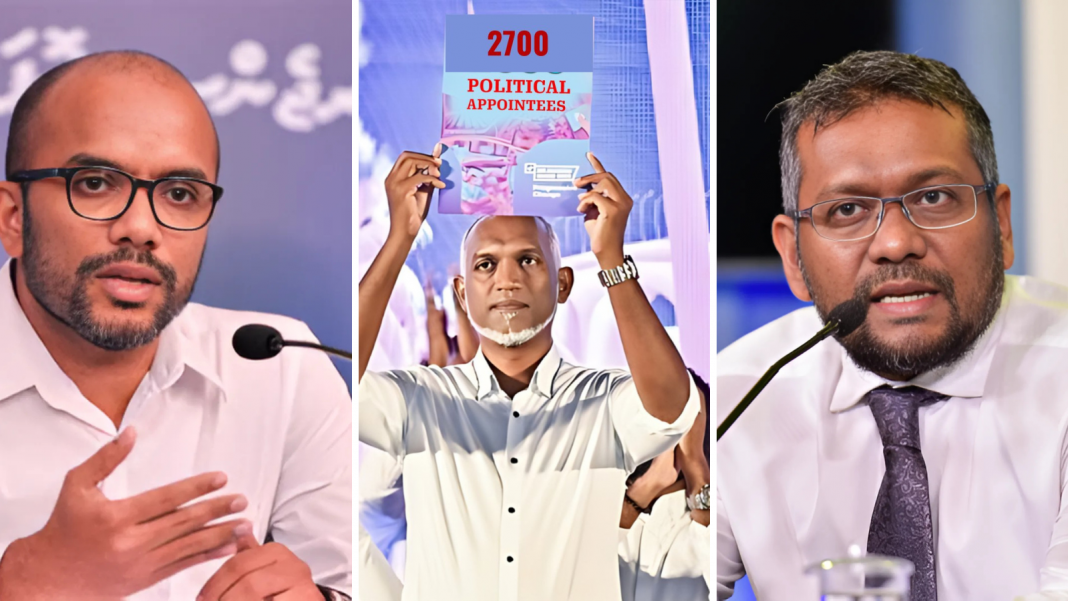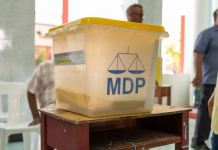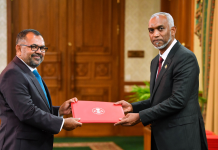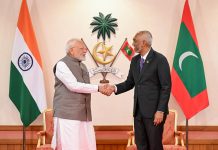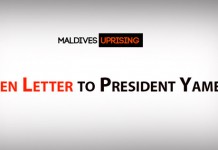Former Finance Minister Ibrahim Ameer and opposition leader Fayyaz Ismail have criticized President Muizzu’s administration for prioritizing political appointments over the urgent needs of government employees and the economy. Their remarks follow the government’s recent announcement of a 10% salary cut for political appointees and employees of state-owned enterprises (SOEs) as part of the 2025 budget and a broader economic reform plan. However, this move raises serious doubts about the administration’s commitment to fiscal responsibility.
In a post on X , Ameer highlighted the enormous financial burden of political salaries, revealing that the government spends over MVR 50 million each month on these positions. Even with the proposed salary reduction, this expenditure would still total MVR 45 million monthly. Ameer emphasized that this situation reveals the administration’s failure to control political hiring, a promise made during the campaign that has clearly been broken.</
ދުނިޔެ އޮތީ އިޤްތިސާދީ ބޮޑު ކާރިސާ އެއްގައެއް ނޫން. ކޮވިޑް-19 ފަދަ އާލަމީ ވަބާއެއް އޮތީކީ ނޫން. ބާޒާރުގައި ތެލުގެ އަގު ހުރީ އެވްރެޖްކޮށް ހުންނަ ވަރަށް. މި އަދު މި ފެންނީ- ބައެއްގެ ނާޤާބިލްކަމުން އަމިއްލައަށް ނެތް ހާލަތެއް އުފައްދައިގެން އޭގެއިން އަރައިނުގަނެވިގެން އުޅޭތަން. އަދި…
— Ibrahim Ameer (@iameeru) October 23, 2024
“Contrary to what was promised, political appointees are increasing by the thousands, driving up expenses. The government’s financial strategy has failed, and poor management is now negatively impacting the economy,” Ameer stated. He underscored that the Maldives is not facing a global economic crisis but is suffering from severe internal mismanagement. He pointed out that there are no significant external factors—such as a global pandemic or rising oil prices—to explain the country’s economic struggles.
Fayyaz Ismail echoed Ameer’s concerns, accusing the Muizzu administration of misleading the public regarding salary cuts while expanding the political workforce. In a revealing post on X, Fayyaz disclosed that nearly 3,000 political positions have been created in just 11 months—far exceeding President Muizzu’s campaign promise to limit political appointments to 700. This blatant disregard for commitments showcases a troubling trend of deceit and mismanagement.
އާންމު ރައްޔިތުން އަތުން އަދި ވިޔަފާރިތަކުން ނަގާ ޓެކްސް އެތައް ތަނަކުން ބޮޑުކޮށްފައި، ސިޔާސީ ވަޒީފާތަކުގެ މުސާރައިން 10 އިންސައްތަ އުނިކުރަން ނިންމި ނިންމުމަކީ ދެބޯގެރިދުއްވުމެއް. މިވީ 11 މަސްދުވަހުގެ ތެރޭގައި 3000 އާ ގާތްކުރާ އަދަދަކަށް ސިޔާސީ ވަޒީފާ އުފައްދައިފި.…
— Fayyaz Ismail (@faya_i) October 23, 2024
“It is shameful to talk about increasing taxes on the people unless the number of political employees is reduced to 700 as promised,” Fayyaz stated. This critique highlights a deeper concern: the Muizzu administration is shifting the financial burden of excessive political salaries onto the public through increased taxes, all while failing to uphold its pledge to streamline government operations.
While President Muizzu’s announcement of a 10% salary cut for political appointees and SOE employees appears to be a positive step, it ultimately serves as a façade, masking ongoing failures. The total number of political appointees remains undisclosed, raising alarming questions about transparency and accountability. Fayyaz and other opposition leaders have rightly called for greater clarity regarding the number of political employees, emphasizing the need for the government to adhere to its campaign promises of fiscal responsibility.
These criticisms underscore growing concerns about the Muizzu administration’s economic management, especially as the Maldives faces rising costs, increasing taxes, and a growing political workforce that contradicts the president’s initial pledges.

